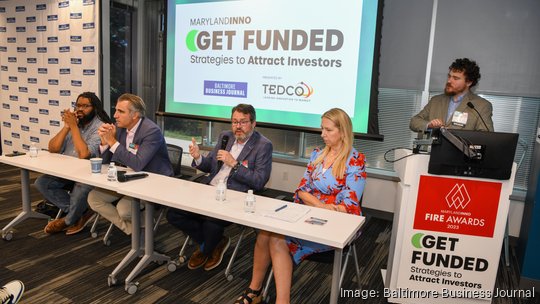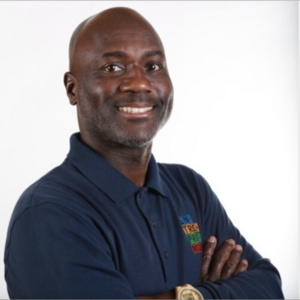
George Nemphos says rich families aren't just buying assets and holding onto them anymore. These so-called "family offices" or entrepreneurial families are actively joining the ranks of venture capital investors in putting their money into startups.
"I believe we're going to see an uptick in funding from unusual sources," Nemphos, an attorney, said about a new wave of tech investors. "Family offices are showing up to the game."
Nemphos, managing member of Nemphos Braue, addressed the trend of family offices during the Baltimore Business Journal's Maryland Inno Get Funded event on July 18. He and a panel of funding experts discussed what it takes to attract investors, existing options to fund your business and resources to take your company to the next level. The event at the Maryland Innovation Center in Howard County was moderated by BBJ reporter Matt Hooke and also included panelists McKeever "Mac" Conwell II, founder and managing partner, RareBreed Ventures; Guy Filippelli, managing partner, Squadra Ventures; and Christy Wyskiel, senior advisor to the president for innovation & entrepreneurship and executive director of Johns Hopkins Technology Ventures.
BBJ Market President and Publisher Rhonda Pringle preceded the panel discussion with a fireside chat with Luke Cooper, founding managing partner of Latimer Ventures.
Cooper pointed out the Greater Baltimore market needs more investment, especially for minority-owned and women-owned businesses. He said too many investors come to the table with bias. He also said that many investors have never been company founders, a disadvantage in determining who should get their money.
Cooper urged the audience to grow their network and get to know people if they want to find funding. He quoted former President Barack Obama saying, "Just get stuff done."
But there was plenty of caution mixed in with the call for networking. The panelists said not everyone, no matter how much they network, will get venture capital funding. Investors tend to prefer software and tech companies, not necessarily those with a physical product. Conwell said non-tech services are "not what VC does."
He also spoke about how the fundamentals of a business must be strong beyond its ability to raise cash. The founder must be able to tell customers and investors why they should buy into their vision.
"If you have a great product but you don't know how to sell it, that isn't a business," Conwell told the audience. "That's a hobby."
Filippelli expanded on that idea, saying that many company founders secure funding because they have a certain magnetism. He said that magnetism not only affects the way these companies sell but the way they hire and eventually sell the company.
"Don't underestimate the founder's ability to raise money," Filippelli said.
If you had any doubt that raising money is hard, that was driven home by the numbers revealed during the talk.
Filippelli said Squadra looks at 10 to 15 deals a week and funds four to five companies a year.
Wyskiel said she receives 500 reports of inventions that could possibly be turned into commercial ventures in her role at Johns Hopkins. She must then determine whether the ideas are worth putting in front of investors.
Nemphos, in counseling his family offices, takes them through "each step of the way" in the process to make sure an investment is the right fit.
Panelists said company founders have to do the same and determine what they're willing to give up equity and control to venture capitalists.
Also, there's the pressure to perform — and quickly.
Conwell said founders must understand that many investors seek a $1 billion valuation of their companies in six to 10 years.
"Can you get there?" he asked.










